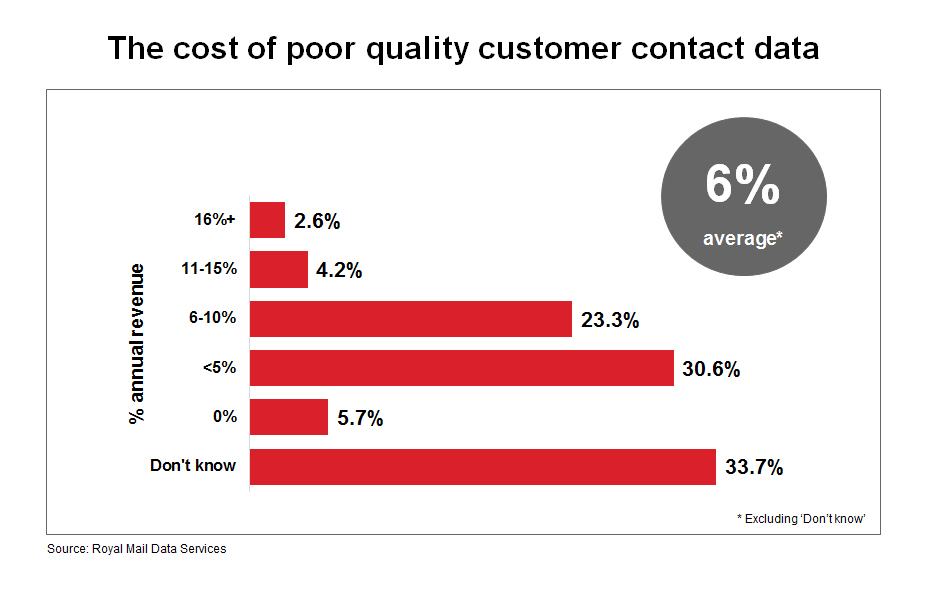As entrepreneurs work to an increasingly intricate and rigorous set of performance metrics, new research from Royal Mail Data Services into the management and use of customer data shows that UK organisations estimate poor quality customer data is costing them an average of 6% of their annual earnings. The myth which resolving data quality is that a fix is partly to blame.
The entrepreneurs we surveyed agree that information quality has the biggest impact on effort conversion and response rates, yet nearly all (91.4 percent) say they are still plagued with data-quality issues.
As companies work to comply with the European Union’s General Data Protection Legislation (GDPR) re-permissioning demands by May 2018, today nearly three in five marketers (58 percent) report having concerns within the compliance of the in-house customer information. There are A similar number shying away from using data because they don’t trust that it will comply with the EU’s new, standards that are rougher data-permissioning. These new guidelines imply that unless businesses act to improve their information quality, they’ll face a shortfall in client information that is usable .
Resolving data problems in the point of catch
With such a dim view of their condition of their information, it’s apparent that entrepreneurs have to make adjustments to boost customer data quality and get ready for permissioning criteria that are new.
Untangling this web starts with recognising the proliferation of sources that capture a variety of customer data throughout the organisation. Digital marketing leads in information capture, with sites (86.9%) and mobile web (48.5%) offering daily influxes of fresh client information. Data collection is also on the rise. Two-thirds of entrepreneurs (64.6%) capture data from direct sales, up from just over half (55 percent) last year. Both resources provide data that comes with first-party consent (direct sales) or can be leveraged to gain it (from sites). Direct customer contact remains an essential information source for nearly half of organizations, via face-to-face (48.5%) or contact centres (45 percent).

With so many active data sources, responsibility for information management can be shared without data collection procedures. While advertising leads in establishing data strategy and collection for the majority of businesses (53.5 percent and 49.5%, respectively), CRM works, customer support, sales and e-commerce often collect customer data too. For some businesses, centralised data management operations or IT take on this function (27.7% and 22.8%, respectively).
As businesses prepare for stricter compliance and re-permissioning rules, all functions responsible for collecting client information must work with their legal and compliance groups, who manage data privacy and permissions in nearly half of surveyed organisations (44.6 percent).
The intricacy of data management structures seems to be compounding the problem. In the three years because Royal Mail Data Services first conducted this study, we’ve observed a rise in the amount of entrepreneurs reporting issues with data. 65% haven’t any procedures in place at all of businesses only cleanse their client data once a year or don’t understand their data is cleansed.
The Company case for better data management
Improving customer information quality starts at the very top. Information and Marketing teams will need to work alongside their IT and lawful colleagues to present clear business cases to tackle the issue. Looming GDPR regulatory deadlines provide organisations with the opportunity to review their information management practices and processes and make the investments that are necessary to conquer customer data management challenges.
With more than seven in 10 organisations beginning their data-quality travels with incomplete, incorrect or out-of-date customer data, marketers should think about working with a trusted partner to validate their existing client information, and create a universal process for automatically validating all incoming data in the point of capture. Once data is supported, setting continuous data-cleansing and improvement procedures will maintain customer information true, permissioned and compliant within the long term. Using customer contact data that is permissioned and compliant can help entrepreneurs maintain up contact data to date. Finally, companies need to put re-permissioning strategies in place today to ensure compliance ahead of the May 2018 deadline.
Making sense of historical problems can seem overwhelming, but together with professional guidance and constant commitment throughout the company, 2017 can function as year the door finally shuts on poor-quality consumer contact information.
Editor’s note: You can find out more about the study findings.

